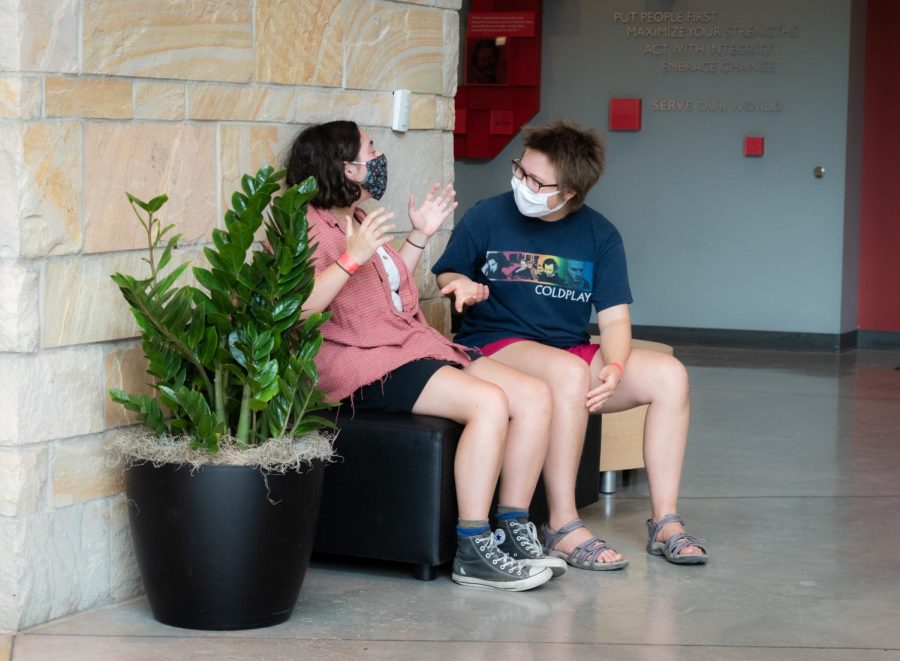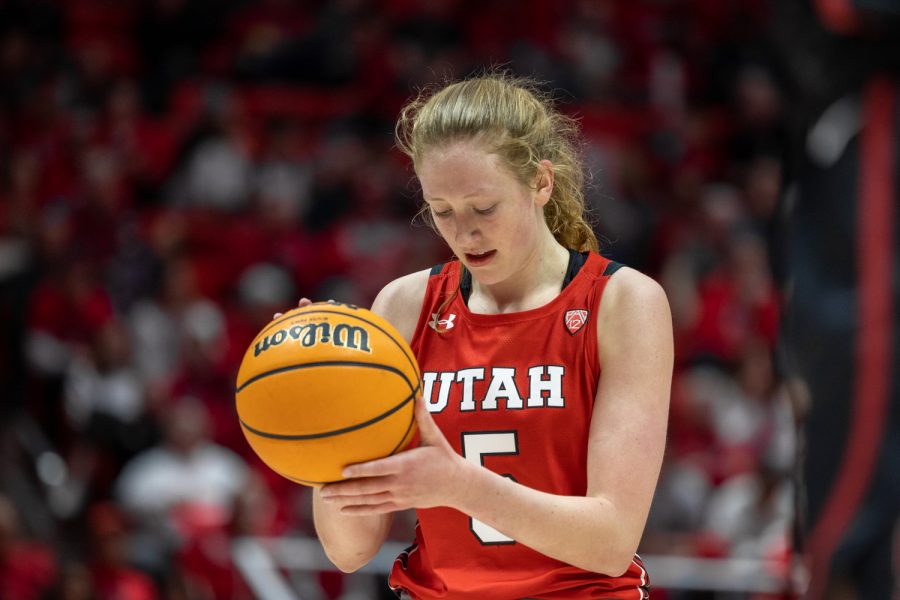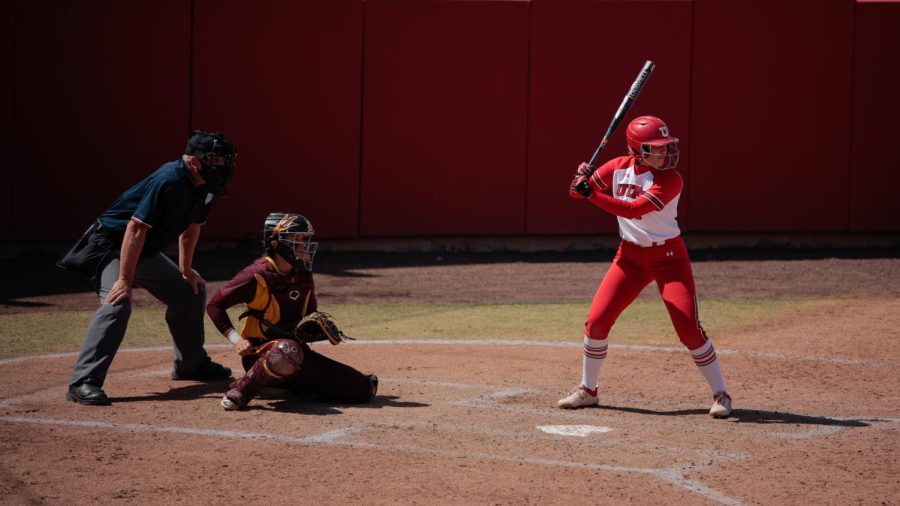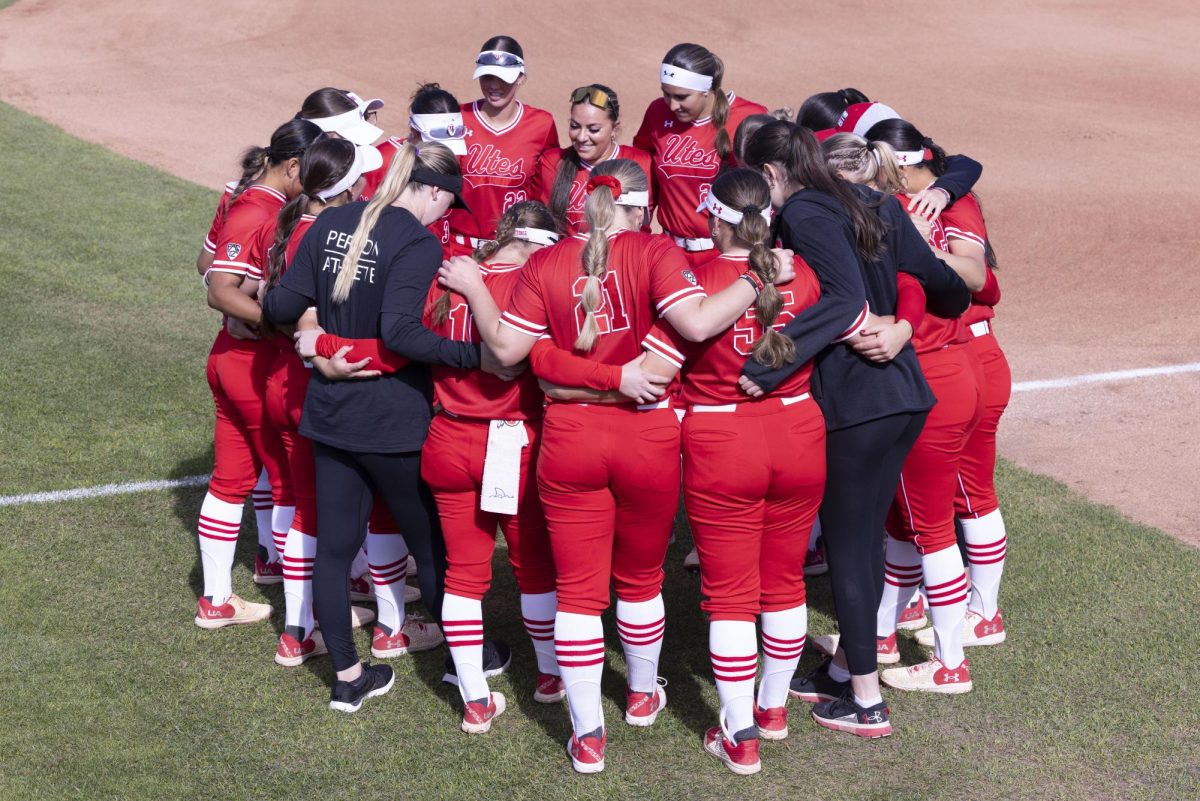#GiveUsEmpathy: Student Leaders at the U Speak Out About HRE Concerns
Two students in the MHC lobby wearing masks. (Photo by Jack Gambassi)
August 24, 2020
On Aug. 20, resident advisors at Cornell University threatened to go on strike on Aug. 22 if their demands for safer working conditions, more communication and for administration to #GiveUsEmpathy were not met. The resident advisors proceeded to go on strike for two days, until their concerns were addressed.
On Aug. 23, RAs and Social Justice Advocates at the University of Utah created an Instagram and Twitter account (@utah_ra_sja) to post their calls to action and demands.
“We the RA’s & SJA’s at the University of Utah insist that a meeting be scheduled by Lori McDonald or Barb Remsburg within the next five days to meet our demands; if our needs remain unacknowledged and unmet, we are prepared to take further action,” the post read.
A meeting was held on the night of Aug. 22 by RAs who drafted a form which asked student leaders to sign it to show their support for the demands. Student leaders could put their initials or sign with letters such as “XYZ” to remain anonymous.
Currently, over 100 out of 115 student leaders have signed the form.
In one Twitter post, they directly addressed Remsburg and McDonald.
“We were promised transparency, but received ambiguity during a time where clarity can be life-saving. Your poor planning is jeopardizing our safety,” the post read.
After Housing and Residential Education received an anonymous email on the morning of Aug. 23, they arranged a conference call to address the concerns of student leaders. All student leader shifts were canceled for the day as well.
The Zoom meeting had around 40 student leaders, all participating under an alias with their cameras turned off.
Todd Justesen, the director for residential education and Remsburg gave some opening remarks. However, the remainder of the meeting was spent addressing specific comments and questions sent in by student leaders in the chat function on Zoom.
A main concern among student leaders is they have not been given the proper personal protective equipment to handle high-risk situations.
“I do have a question as to why we were not issued adequate PPE when working in the testing center. Why is it that we have to ask for PPE? That should have been provided for us,” an anonymous commenter wrote.
Justesen responded by saying safety glasses and gloves will be provided for every student leader, who have currently only been given a mask.
However, according to several resident advisors, student leaders are required to frequently interact with large groups of people who are not following proper social distance guidelines. They have to be in close proximity with these people for as long as it takes to collect UIDs from each student to file incident reports.
“There are virtually no consequences for students not wearing masks, we feel that we are on duty all the time because we are constantly needing to police herds of unsafe students just to protect ourselves, much less to fulfill our duties,” one comment said.
In Spring 2020, when most students were forced off campus due to the pandemic, HRE did not clearly communicate to student leaders if their housing contract would remain viable. Thus, student leaders are asking HRE to give them written support of housing security if campus were to be shut down again.
In the Zoom meeting with HRE and student leaders, Remsburg suggested an open cancellation period.
“If cases increase to the extent to which it jeopardizes the ability to hospitalize folks … if some of those factors start reaching maximum capacity, we have to relieve pressure somewhere. And that could be that one of those pressure points would be that we open up an open cancellation period,” Remsburg said.
In the event that campus has to shut down again, Remsburg said she wants student leaders to make the decision that is comfortable for them.
“If students aren’t wanting to live on campus, we don’t want our contract implication to be the reason they’re staying,” Remsburg said.
However, housing and employment may not be guaranteed if campus closes.
“I wont say that there is a guarantee that something might happen that will not impact our housing or employment for any one of us and that the reality of an unknown situation,” Remsburg said.
Justesen and Remsburg frequently attempted to empathize with student leaders by saying they understood the intense amount of work that needs to be done.
“One of the additional elements was ‘overburdened’, and I think we can all feel that and recognize that,” Remsburg said.
However many student leaders took to the chat to point out HRE staff are paid, whereas student leaders are given room and board, but no extra pay — even when they work more hours than the 20 hour work week they agreed to.
Additionally, student leaders have recently been tasked with delivering meals to students who have to self-isolate after testing positive. They included this in their list of demands on Instagram.
“The entire HRE staff should be given the ability to opt out of doing meal delivery for COVID-19 positive residents if concerned for their safety,” one post read.
In a previous interview with the Daily Utah Chronicle, Timothy Davis, associate director of residential education stated that aside from meal deliveries, student leaders have not been given any new tasks as a result of the pandemic.
“In terms of additional responsibilities that the RAs have, there aren’t many. We are conducting meal delivery for students who are in isolation and quarantine. What we’ve given resident advisors the ability to do is when they do that, it is a no contact meal drop off,” Davis said.
However, anonymous comments from student leaders say otherwise.
“I’ve been exposed to thousands of people already with the extra duties I’ve been given,” one comment said.
With over 200 comments in the chat, most going unanswered, the call ended with Justesen and Remsburg reiterating that they are open to communication with student leaders.
“We’re going to open a lot of communication where this is going to be more consistent … trying to establish what you want … we can address an open concern … there’s no retaliation to take place,” Justesen said.
Student leaders said they would like their concerns explicitly addressed in writing by Aug. 27, or else they will take further action according to their post.
As for now, weekly meetings will be set up to address student leader concerns.
“A weekly group call will be set up for all HRE student leaders to raise questions, concerns, give feedback so that we can help to support them in their roles and to listen to their feedback,” said Justesen, Davis and Remsburg in a statement to the Daily Utah Chronicle.














JULIO FACELLI • Aug 26, 2020 at 1:54 pm
Masks are not a replacement for social distancing! The picture is a good example of the lack of understanding of this concept, as far as can be seen does not appear to be good reason why the students in the picture should not be separated by at least 6 feet, while still using masks. Getting close to each other should be allowed only under extreme need, a health worker examining a patient, or similar situations in which social distancing is not possible.